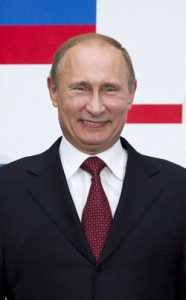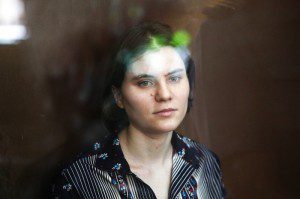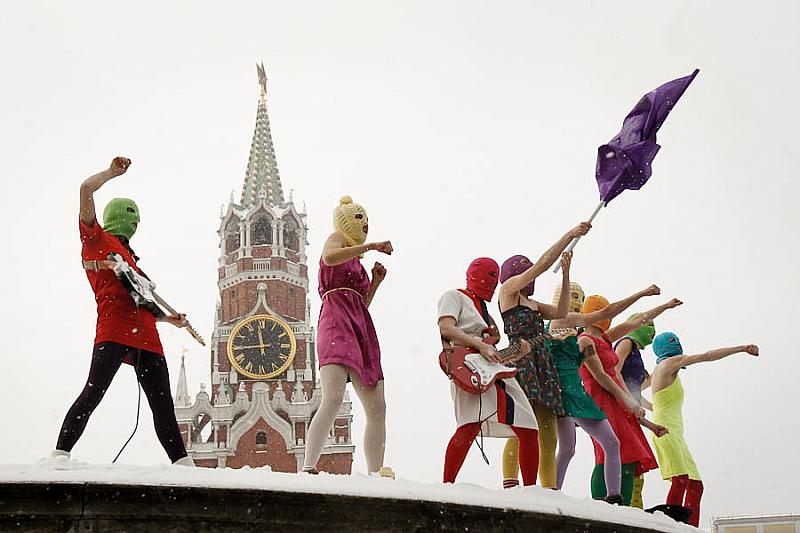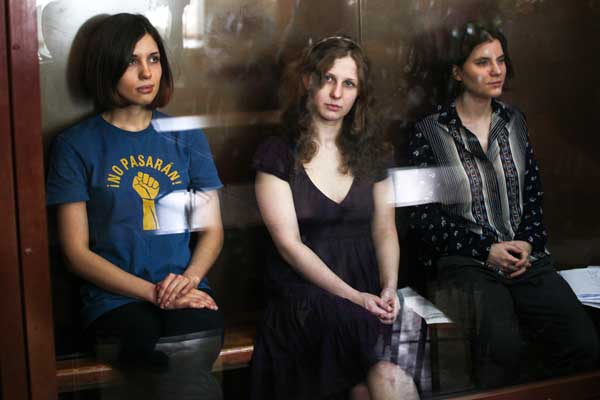Index relies entirely on the support of donors and readers to do its work.
Help us keep amplifying censored voices today.
A year after the mass protests marking Vladimir Putin’s controversial presidential win, Elena Vlasenko reports from Moscow on the heavy-handed repression confronting the Russian opposition.
On 6 May 2012, the day before Putin’s inauguration, tens of thousands marched towards Moscow’s Bolotnaya Square, protesting against his return to power, fuelled by allegations of election fraud.

Russian President Vladimir Putin visited the Netherlands in April 2013. (Photo: Pierre Crom / Demotix)
The rally was to be the culmination of the historic peaceful protests for fair elections in late 2011. The plan had been to end the march with a rally in the sqaure, where the throng of protesters were funneled through metal detectors. A splinter group launched smoke bombs at the police, which erupted into violent clashes with security forces. Hundreds were arrested — including opposition leaders Alexei Navalny and Sergei Udaltsov — and many faced criminal charges for participating in “mass riots.”
Days later, when 200 protesters protested the Bolotnaya Square arrests, organisers of the encampment were arrested. Criminal charges were brought against almost 30 protesters, most of whom, according to rights activists, were either mistakenly prosecuted or should have faced lesser administrative charges.
In April 2013, a public inquiry led by members of Russia’s opposition and human rights activists refuted the official narrative around the 6 May rally. The inquiry found that the response of protesters was an act of “self-defence”, provoked by “police officers and masked men”. Despite the findings, there is an air of pessimism about the political climate.
The deterioration of the free expression environment in Russia has accelerated since Putin’s inauguration. Authorities prosecuted Pussy Riot and instituted of a number of repressive laws against non governmental organisations, rally organisers, and re-criminalised defamation. There is also an ever-growing blacklist of websites. The second reading of the so-called “homosexual propaganda” law is planned. Yet, none of these recent actions have been met with a substantial response from Russia’s opposition.
Student Blog Competition
Think you have what it takes to be published by Index on Censorship? Here’s your chance to find out. More >>>
Index on Censorship Events
Caught in the web: how free are we online? June 10, 2013
The internet: free open space, wild wild west, or totalitarian state? However you view the web, in today’s world it is bringing both opportunities and threats for free expression. More >>>
Last October, groups opposed to the Kremlin created the “Opposition coordinating council” — an online, elected pseudo-parliament meant to legitimise opposition leaders. Throughout its young existence it has received criticism — not from pro-Kremlin media or activists, but from people who voted for them or participated in the elections — for using expensive facilities for their monthly meetings. In fact, most elected opposition leaders don’t attend these meetings, which means that the council doesn’t have the quorum to make decisions. The council’s decisions are also minor administrative details about bylaws, and have less to do with fighting to change the current system.
The council, created to form a united opposition strategy, still hasn’t decided whether it should criticise Putin and demand his resignation, or to call on him to implement radical reforms.
Even though it has failed to give a strong response to the Kremlin’s attempts to silence dissidents, the opposition has faced criminal prosecutions of its leaders. Sergei Udaltsov is currently under house arrest on charges of organising “mass riots” and political activist Alexei Navalny is facing charges of fraud. The result has been to blunt the rising political power of Udaltsov and other members of the opposition’s leadership.
When this year’s 6 May anniversary rally ended, demonstrators were made to pass long lines of soldiers blocking their way to the Red Square and many other places, forcing the protest’s traffic towards Moscow’s metro stations. One could hardly call the picture of protesters winding through rows of soldiers, police and military cars, one of freedom. Without much to expect from either the government or the opposition a general feeling of entrapment hung over Bolotnaya Square’s anniversary protests.
Russian authorities not only have narrowed the rules regarding NGOs’ activities, but they also subject civil society activists to direct repression, Andrei Aliaksandrau reports
MOSCOW. 26 October 2012 (INDEX).
Earlier this month a Moscow court freed Ekaterina Samutsevich, one of three imprisoned women from Russian punk band Pussy Riot but upheld the two-year jail term handed down to her bandmates. Samutsevich, Maria (Masha) Alekhina and Nadezhda (Nadya) Tolokonnikova were convicted of hooliganism in August after staging a “punk prayer” in a Moscow cathedral to protest the Russian Orthodox Church leader’s support for the president Vladimir Putin ahead of the Russian presidential election. The band’s conviction came amid a wider crackdown on dissent, which has included tighter controls on media, moves towards internet censorship and the harassment and arrest of opposition activists and civil society.

Pussy Riot member Ekaterina Samutsevich sits in a glass cage at a court room in Moscow, August 2012. Maria Pleshkova | Demotix
Samutsevich — also known as Katya — believes everyone has social and political responsibility, and that artists have the power to make “people understand problems they couldn’t see before.” And exercising that responsibility is how Katya got in trouble.
In a week where her comrades were sent to harsh prison camps in remote Russian regions, Samutsevich gave this exclusive telephone interview to Elena Vlasenko, Index on Censorship’s Russia correspondent, and assured her Pussy Riot is here to stay.
INDEX: You were given a suspended sentence on appeal after you alone switched lawyers. The judge’s decision hung on the fact you were ejected from the cathedral before being able to perform but your friends remain in prison. Are the rumours about a split in the group true?
Ekaterina Samutsevich: All the talk about divisions in Pussy Riot are the authorities’ attempt to spin the situation. We definitely didn’t expect my release on probation, [we] thought the sentence would not change. Anyway, this is a victory for all of us … one person out of three is released, or at least on a suspended sentence. Nadya and Masha hugged me and congratulated [me] on this.
INDEX: Why did you switch lawyers? Who disliked your previous lawyer Violetta Volkova most — you or the judge?
ES: Prisoners sometimes change lawyers several times per trial, and that’s ok. I don’t really want to emphasise it, like some media do, that is why I prefer not to comment on the issue.
INDEX: How did you say goodbye to Nadya and Masha? Are you managing to stay in touch?
ES: We wished all the best to each other. We used to write each other letters almost every day before their departure to the penal colonies, but now it’s hard to communicate.
INDEX: You filed an appeal to European Court of Human Rights saying your prosecution and detention violated article 10 of the European convention — free expression — and article 3 — prohibition of torture. Why article 3?
ES: We consider ourselves innocent and the very fact of our detention illegal. The court obviously wanted us exhausted. We were woken up every day at 6am and taken to the court at about 9am, no matter what time the proceedings started. Sometimes we had to wait several hours in a room under convoy before we finally got to the courtroom. The same waiting happened after the proceedings. We spent several hours under convoy waiting for a car, and another hour — in front of the pretrial prison gate. We entered the cell at about 1am. The next day we had to get up at 6am; every day of the proceedings would be the same. Before the proceedings we had to come to the court every morning to familiarise ourselves with the case … We spent two and a half weeks on this schedule.
As a rule, if a case isn’t big — normally criminal cases run to tens of volumes, and ours was only seven — the court holds proceedings once a week. But not this time. From our perspective, the rush was deliberate so that we were too tired to understand what was going on during the proceedings. I was so exhausted once we had to call the ambulance. And the doctors had to give Masha an injection as her blood sugar level dropped dramatically and she was awfully dizzy.
It was torture for us.
INDEX: One could see how physical and rude the bailiffs were to you after the judge ruled. Why?
ES: They were extremely rude and very rough while escorting us to the car: they twisted our arms, for example, maybe so that we couldn’t wave to our supporters. This rudeness is typical towards any person in handcuffs in Russia.
INDEX: Other members of Pussy Riot who remain in hiding told Index on Censorship if they could turn back time they would still repeat the punk prayer. Would you?
ES: Nobody expected the arrests. Punk prayer is not a crime, besides, we successfully left the cathedral without being detained. Of course, we would repeat our prayer: we can’t stay silent … But we would definitely sing the song to the end, the guards didn’t let us that time. I personally would prefer to stay in the cathedral for all the song’s duration, not just 15 seconds.
INDEX: From your perspective what event changed Russia, making it once again the kind of country where controversial trials, like yours, are possible — Putin’s presidency, the Chechen war, the 1996 elections? What was the point of no return?
ES: I don’t think there was a point at all. There are many factors, and one of the most important one is the authorities’ policy towards culture and education. The prerequisites appeared long ago — there was no freedom of expression in the Soviet era — but the situation began worsening sharply when Putin came to power.

Members of Pussy Riot performing in Moscow’s Red Square
People don’t have opportunities to learn about modern art, culture and civil politics. They think politics is a number of high ranking people who sit in their offices. Citizens don’t see themselves as part of policy making, because they simply don’t know they have the right and means to become part of the process. The lack in education leads to the lack of civil protest culture. As a result they play by the rules dictated by authorities.
The only solution is education and self-education, which is becoming more possible because of the internet. The internet is indeed our rescue – as a source of education. The second most important thing is a will to unite, like the lesbian, gay, bisexual, and transgender activists or ecologists recently did. It is important not to count on one leader who will save everyone. There won’t be one, and there shouldn’t be. Pussy Riot is against leaders, we stand for more complex structures of civil communities.
INDEX: Western artists and intellectuals supported you more vocally than those in your own country. Has Pussy Riot suffered for the growing political indifference of Russia’s intellectuals and the artistic community?
ES: Pussy Riot does pay for this. But not only for intellectuals and people of art, but for the whole country’s political indifference. But we should take political pressure and censorship into account. We don’t have art communities which are 100 per cent independent of the authorities.
INDEX: Pussy Riot stands for political art. Does that mean you believe artists have a responsibility to speak out?
ES: Yes, of course, but it is not just artists that have social and political responsibility. Every person is responsible for seeing what surrounds them and for expressing concerns over it. Citizens are provided with power by the constitution and they have a right to influence the situation in a country. That’s what they should do, especially artists. They have the power and knowledge to communicate serious issues in clear, efficient ways which make other people understand problems they couldn’t see before.
INDEX: When will you achieve your goals and stop performing? What is the perfect future for Russia – one where Pussy Riot is no longer needed?
ES: This will happen years from now; now the government is only intensifying repressions. The current power should change the model of its behaviour. People should form a strong and active civil society, which will influence and dominate the authorities — the opposite of what we have now… So we will continue fighting.
 Three members of feminist punk band Pussy Riot were today found guilty of “hooliganism motivated by religious hatred” by a Moscow court, and sentenced to two years in prison.
Three members of feminist punk band Pussy Riot were today found guilty of “hooliganism motivated by religious hatred” by a Moscow court, and sentenced to two years in prison.
Kirsty Hughes, Chief Executive of Index on Censorship, said:
“In Putin’s Russia, free expression has become a crime. The women of Pussy Riot should be released immediately — and should never have been put through this absurd case. Artistic expression is not a crime — it’s a right, and an integral part of all free societies. The PussyRiot verdict is the latest indication that Vladimir Putin’s Russia does not respect human rights and is sliding backwards to dictatorship”.
Nadezhda Tolokonnikova, Maria Alekhina and Ekaterina Samutsevic were arrested in March, after performing a 40-second “punk prayer” against Russian President Vladimir Putin in Moscow’s Christ the Saviour Church. The case has been condemned by activists as being politically motivated, and has drawn criticism from well-known musicians from across the globe.
For media enquiries on this story, please contact [email protected]